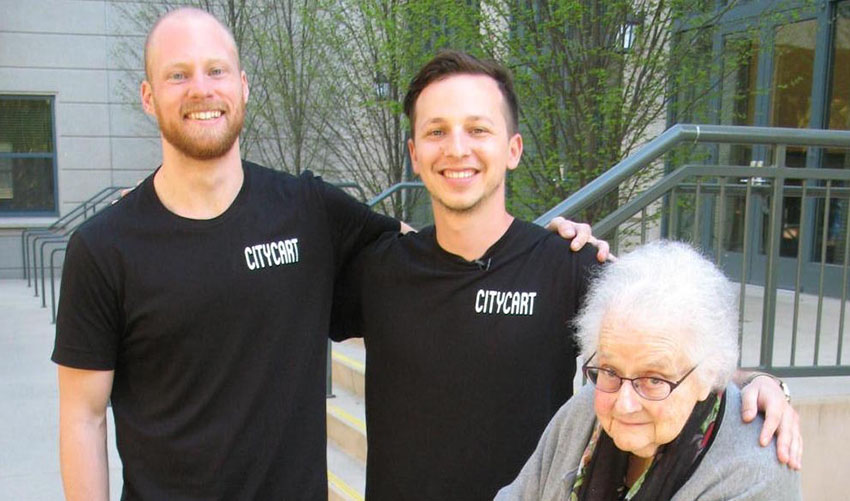Shopping cart for mobility-impaired wins student design challenge

From left, recent SF State graduates Eric Renard and Brandon Lopez worked with "tester" June Fisher before taking home the first-place trophy in the 2015-16 Stanford Center on Longevity Design Challenge. "Go against the grain. Carve your own path and do what makes you happy. That's what sets you apart and how you build your personal skills," said Renard.
Recent SF State graduates Brandon Lopez and Eric Renard are having a great year. They both earned industrial design degrees in May and landed jobs at the same start-up in Santa Cruz before they even graduated. But ask them what they're most proud of, and chances are it's the first-place award they took home in the 2015-16 Stanford Center on Longevity Design Challenge for their innovative City Cart — a walker/shopping cart hybrid designed to help users with mobility issues safely and easily make shopping trips. With the award came $10,000 and free entrepreneur and product development assistance.
One goal of the challenge was to create well-designed, practical solutions that address key issues associated with aging. Lopez and Renard developed the City Cart in their Product Design 2 class under the watchful eye of Professor of Design and Industry Ricardo Gomes. Since the challenge began in 2013-14, Gomes said four SF State product design teams have made it to the finals. This year, City Cart was among 12 finalists, which included teams from neighboring University of California, Berkeley and Stanford, to those as far away as Koç University in Istanbul, Turkey and National Yunlin University of Science and Technology in Taiwan.
During the one semester class, Lopez and Renard worked closely with 82-year-old June Fisher — "the main tester" — Lopez said, to develop the City Cart. They joined her on trips to the farmer's market and on public transportation to fine-tune every iteration of the design until the winning prototype was created.
Though the Department of Design and Industry is small, said Renard, "The faculty are great. There are a lot of really talented people, and it's like a family. You move through the same classes with the same group of people, and everyone becomes really close."
Lopez and Renard plan to use the award money to create a new prototype and eventually bring the City Cart to market. In the meantime, they are enjoying their new careers. "We get to do what we love straight out of college and get paid for it," Renard said. "The money is secondary. It's the fact that every day we get to do what we want to do. That's a great feeling."